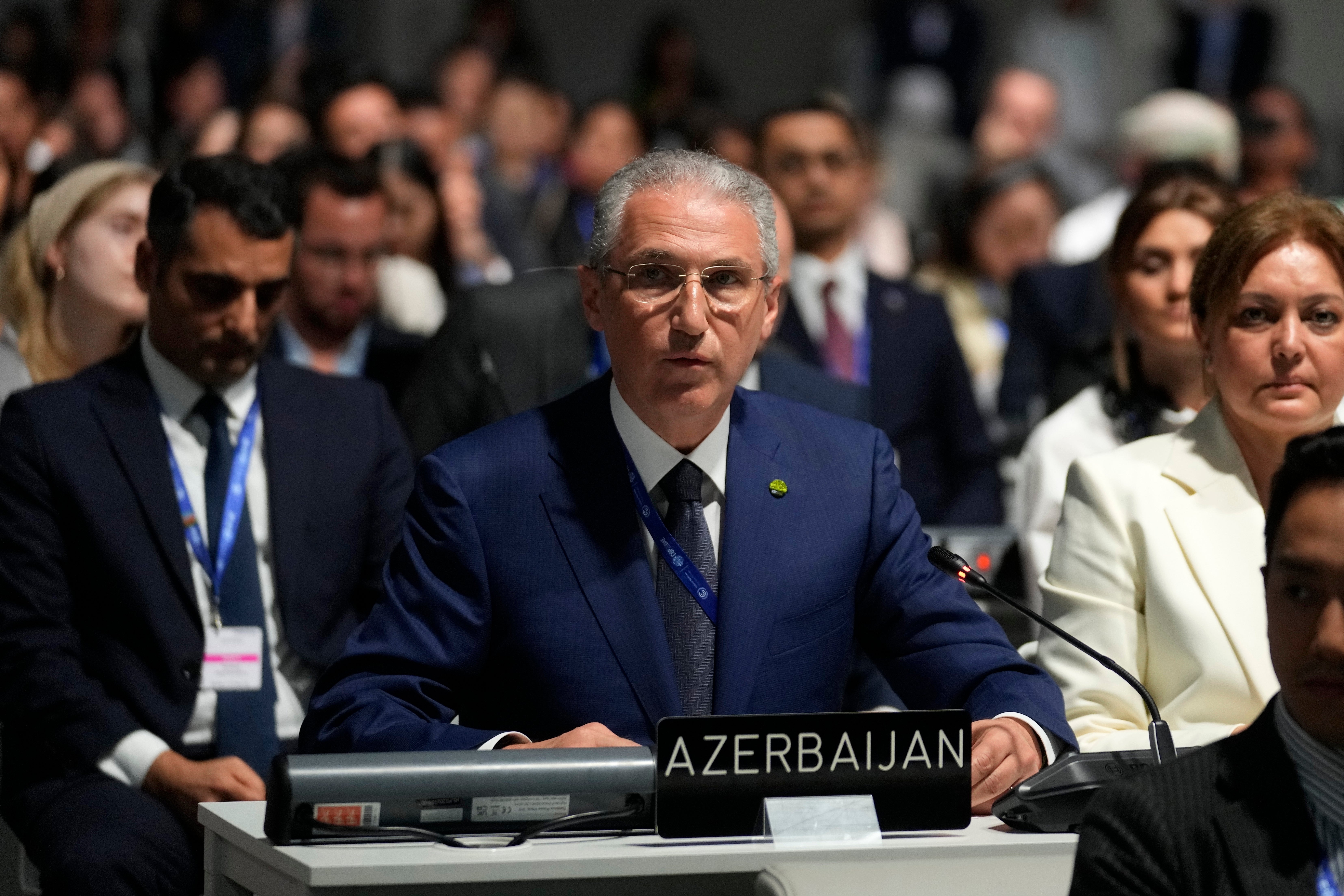Azerbaijan names a former oil exec to lead climate talks. Activists have concerns
Azerbaijan’s ecology minister has been named to lead the United Nations’ annual climate talks later this year

Your support helps us to tell the story
From reproductive rights to climate change to Big Tech, The Independent is on the ground when the story is developing. Whether it's investigating the financials of Elon Musk's pro-Trump PAC or producing our latest documentary, 'The A Word', which shines a light on the American women fighting for reproductive rights, we know how important it is to parse out the facts from the messaging.
At such a critical moment in US history, we need reporters on the ground. Your donation allows us to keep sending journalists to speak to both sides of the story.
The Independent is trusted by Americans across the entire political spectrum. And unlike many other quality news outlets, we choose not to lock Americans out of our reporting and analysis with paywalls. We believe quality journalism should be available to everyone, paid for by those who can afford it.
Your support makes all the difference.Azerbaijan's ecology minister has been named to lead the United Nations' annual climate talks later this year, prompting concern from some climate activists over his former ties to the state oil company in a major oil-producing nation.
Mukhtar Babayev's appointment was announced on X by the United Arab Emirates, which hosted the climate talks that just ended in December, and confirmed Friday by the United Nations. Officials in Azerbaijan did not immediately respond to messages seeking to confirm the appointment.
Babayev has been his country's minister for ecology and natural resources since 2018. Before that, he worked at Azerbaijan's state oil company for more than two decades.
Similar concerns dogged Sultan al-Jaber, the head of the UAE's national oil company, as he presided over the talks in Dubai known as COP28. The COP president is responsible for running talks and getting nearly 200 countries to agree on a deal to help limit global warming, and skeptics questioned whether al-Jaber would be willing to confront the fossil fuels causing climate change.
The conference ultimately resulted in a final agreement that for the first time mentioned fossil fuels as the cause of climate change and acknowledged the need to transition away from them, but it had no concrete requirements to do so.
Oil and natural gas bring in around 90% of Azerbaijan’s export revenues and finance around 60% of the government budget, according to the International Energy Agency. Climate activists said the country needs to look past its own fossil fuel interests if it's going to host successful talks.
Mohamad Adow of climate think tank Power Shift Africa said it’s “concerning to be once again having the world’s climate negotiations coordinated by a petrostate that has a big interest in oil and gas production." But he was hopeful that climate negotiators could be successful in Azerbaijan’s capital Baku as “the COP in Dubai resulted in an outcome more positive than many expected.”
“He’s got a huge job to do," said Adow. "He needs to start working on getting rich countries to deliver serious, long-term finance that will tackle the climate crisis.”
Harjeet Singh, global engagement director for the Fossil Fuel Non-Proliferation Treaty Initiative, said that “with another petrostate hosting the climate conference, our concerns multiply."
Babayev "must transcend the vested interests of the powerful fossil fuel industry that is primarily responsible for the climate crisis," Singh said.
Melanie Robinson, global director for the climate program at World Resources Institute, didn't comment directly on Babayev but said “stakes will be high” in Azerbaijan, where nations will tackle issues including how to finance climate change adaptation and mitigation around the world, particularly in poorer countries.
“As with all presidencies, the world will be looking to Azerbaijan to fairly facilitate the most ambitious outcome possible,” she said.
The United Nations moves the talks around the world with different regions taking turns. They're typically announced two years in advance, but the decision to hold 2024 talks in Azerbaijan came just 11 months before the negotiations are supposed to start.
That was due to a longtime standoff between Eastern European nations, the region designated to host in 2024. A prisoner swap between Azerbaijan and Armenia in early December led to Armenia supporting Azerbaijan's COP29 bid.
___
The Associated Press’ climate and environmental coverage receives financial support from multiple private foundations. AP is solely responsible for all content. Find AP’s standards for working with philanthropies, a list of supporters and funded coverage areas at AP.org.